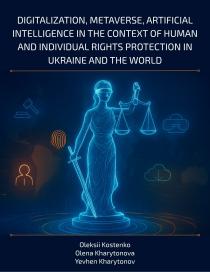METAVERSE, AI, ANTHROPOCENTRISM OF LAW AND SUI GENERIS: AUTHORSHIP WITHOUT AN AUTHOR OR CHALLENGES AND PROSPECTS OF THE DIGITAL AGE, THE LIMITS AND POSSIBILITIES OF FUNDAMENTAL HUMAN RIGHTS
Synopsis
The rapid development of technology is changing the structure of business and production. Building an economy based on big data analysis, automation, robotization, Internet of Things, artificial intelligence, immersion technologies and blockchain sets new requirements for the qualification of specialists, significantly changes the essence of certain specialties and stimulates the emergence of new professions. The coming years opens new perspectives and allows you to develop a conceptual vision of the reality of the future, which combines the physical and virtual worlds. It is important to understand the current state of technology to build the reality of Metaverse. Today, there are Metaverse concepts. However, to predict the trends in the development of society in the Metaverse, it is necessary to analyze the current level of technological development, which is the basis for the development of the Metaverse.
Topical problems of ensuring and violating fundamental human and civil rights and freedoms in connection with the use of artificial intelligence technologies are analyzed, the impact of these technologies on human rights and freedoms is studied, specific facts of violations are analyzed, the main challenges and threats are identified, and legal methods of their protection are outlined. A comprehensive analysis of the legal regulation of legal relations related to the use of artificial intelligence (hereinafter referred to as AI) in Ukraine is carried out, the existing gaps in legal regulation are identified. The development of artificial intelligence and its impact on human rights are analyzed. life of mankind. It examines how various AI systems are used in the world today and how they can help and harm society. Artificial intelligence opens wide opportunities for both people and corporations and states in general: in particular, it is about simplifying decision-making processes, ensuring the safety of citizens and streamlining the work process.










